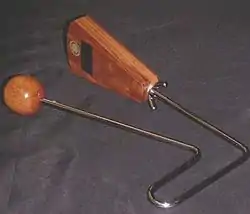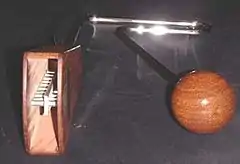Vibraslap
The vibraslap is a percussion instrument consisting of a piece of stiff wire (bent into a U-shape) connecting a wooden ball to a hollow box of wood with metal “teeth” inside. The percussionist holds the metal wire in one hand and strikes the ball (usually against the palm of their other hand). The box acts as a resonating body for a metal mechanism placed inside with a number of loosely fastened pins or rivets that vibrate and rattle against the box.[1] The instrument is a modern version of the jawbone.[2]
 A vibraslap manufactured by Latin Percussion |

Invention
The vibraslap was the first patent granted to the instrument manufacturing company Latin Percussion.[3]
The vibraslap was invented by Martin Cohen in 1967.[4] Cohen was told by percussionist Bobby Rosengarden, "If you want to make some money, make a jawbone that doesn't break." About the inventing process, Cohen remembers, "I had never seen a jawbone before, but I had heard one on a Cal Tjader album. I found out that it was an animal skull that you would strike, and the sound would come from the teeth-rattling in the loose sockets. So I took that concept and invented the Vibraslap, which was my first patent."[5]
Origins
The vibraslap descended from the African "jawbone". This is the lower jawbone of a donkey or a zebra which has loose teeth that rattle when the instrument is struck.[6] The instrument was carried by enslaved people to South America where it became known as the Quijada.[7]
References
- "Vibra-Slap", Music.VT.edu. URL last accessed December 11, 2009.
- "Donkey Call or Vibraslap". Ethnic Musical Instruments.com. Retrieved April 26, 2015.
- "LP Vibra-Slap II - Standard Wood (LP208)". Steve Weiss Music. Retrieved 2023-02-23.
- US3439572A, Cohen, Martin B., "Percussion instrument", issued 1969-04-22
- "PASIC 2012 Archived August 24, 2014, at the Wayback Machine", PAS.org. URL last accessed December 11, 2009.
- Karl Peinkofer and Fritz Tannigel, Handbook of Percussion Instruments, (Mainz, Germany: Schott, 1976), 159.
- "Afro Peruvian Percussion". artdrum.com. Retrieved 2023-02-23.